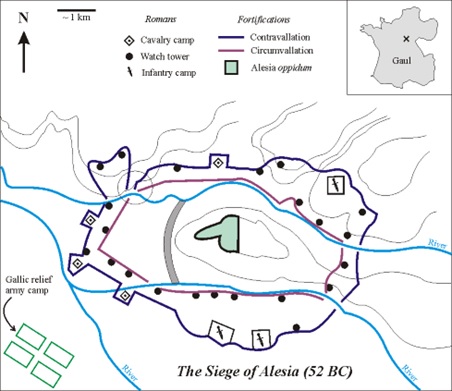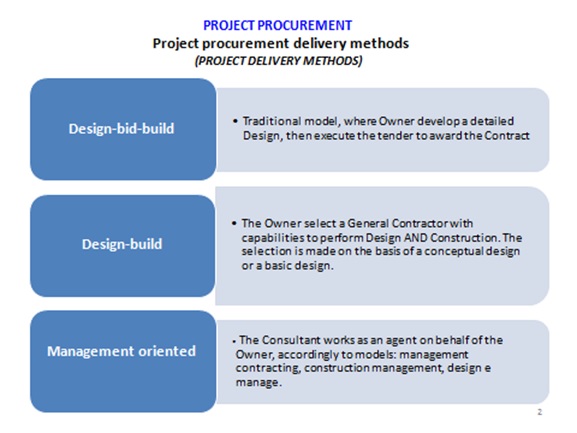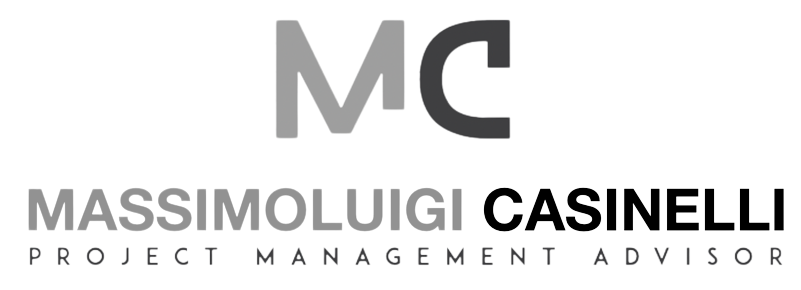Abstract
The Project’s Owner should lead the strategic project planning to setup and implement the most suitable project management system in order to guarantee the success of the capital investment project. This require a different role, by acting as an agent to develop project management.

Strategic project planning phase
This is a critical phase during which the project Owner operates the strategic choices that will shape the entire life cycle of the project:
- developing of the project procurement strategy (i.e. select the project delivery method), and
- defining the project management model through which the project’s Owner wishes (or can) operate.
These two strategic choices are interrelated, as the model of project management (in terms of organization, processes and tools) depends upon the project delivery method, and this depends, in turn, upon the actual Company’s organization and, ultimately, upon the importance of the specific project
The strategic project planning phase entails the selection of the project procurement model ( i.e. project delivery method), the development of the contract strategy and the definition of the project management model, which also might include the choice of the proper form of the project management assistance for project’s Owner.
All the above components form the project management strategy, which must be transferred in the “design” of Contracts and translated coherently into the contract terms.
More specifically, the strategic project planning phase, from Owner view point, covers three sub-phases:
- Pre-contractual phase (strategic project planning phase): Provide support to the Owner in the chosen of overall program organization (model of project management, project procurement methods (i.e. project delivery methods), risk and quality polices.
- Contractual phase: Lead the contracts development and project management system set up, by collaborating with legal advisors to guarantee the development of the whole set of contract‘s framework: project management procedures and relevant contractual specifications, governing risks and strategies defined in the previous phase.
- Pre-planning phase: Verify Scope definitions and general contractor’s organization alignments, in order to drive the right implementation of the contractual project control system.
Project procurement strategy: choices of project delivery method

In case of large and complex capital investment, which are strategic to the core business of the organization, (as for example a new Metro program, a new pharmaceutical production plant), the project Owner needs to get organized to perform complex program/project management. In this case the most probable choose regarding the project delivery method is the Design-Build model, but this entails some implications in terms of competences and organization on behalf of the Owner. In other words the Owner might need project management assistance, unless its organization has internally a specific department dedicated to project management.
Project management model
Any project needs to set up the organization dedicated to manage the project; a single person or, as usually, a team composed by various specialists. Many organizations do not have permanent resources or even a department dedicated to project management of their capital projects. Therefore, a critical choice is the type of project management assistance, which depends upon the project delivery method ultimately.
Basically, there are the following models:
Project Management Advisor (PMA) The advisor intervenes when it is requested by the Owner, by limiting the intervention to the issue of “recommendations” and “advises” on specific issues and / or ongoing activities; this may require considerable expertise and experience.
Project Control Consultant (PCC) A PCC is responsible for the design and setup of the system of project control (requirements and procedures of cost control, scheduling, progress measurement and control and accounting, coordination procedures-communication and reporting.) The PCC usually manages the system for the duration of the project, elaborating periodically progress data provided by the Owner.
Project Management Consultant (PMC) The PMC acts as a direct extension of the Owner, which assigns (contractual liability) to the PMC the project management of the whole project-cycle life. PMC typically administer and manage all activities of the project, with the exception (usually) of the issue of payments.
Project Management Team (PMT) In this situation, the staff of the consultant is functionally integrated with the staff of project management of the Owner. In other words the Owner integrates its staff with the resources provided by the Consultant that provides the skills required, in number and level of expertise. PMT has fewer responsibilities than PMC.
Commitment of the Project Owner
The choice of the right type of project management assistance is responsibility of the Owner, and the choice depends upon the nature of the business and the type of organization. In particular the selection between PMC vs. PMT models is critical, as the wrong interpretation of the role and scope of work of the “consultant” might hinder the success of the project.
From the other side, the project management consultancy firms should therefore rethink their role, by acquiring new competences and skills in order to support the project’s Owner right during the strategic project planning phase. In the mean time, the project’s Owner must be able to mitigate the risk of a conflict of interest, because the Consultant might be leaded by own interests and strive expensive but ineffective solutions to the project’s Owner. Finally, few PMC (project management consultancy) firms are capable to offer a comprehensive support during the strategic project planning phase.
Conclusions: a new role of the project’s Owner

The strategic project planning phase entails the selection of the project procurement model, the development of the contract strategy and the definition of the project management model. All above factors are critical for the project success. Therefore, the project’s Owner needs to undertake the role of a project management developer to drive success in their capital projects, as well as to maintain the full commitment during the whole life cycle of the Program. This, in turn require an effective project controls system to guarantee consistent progress measurement, monitoring and communication.
Originally written in May 2024
Last revision edited in May 2023.

